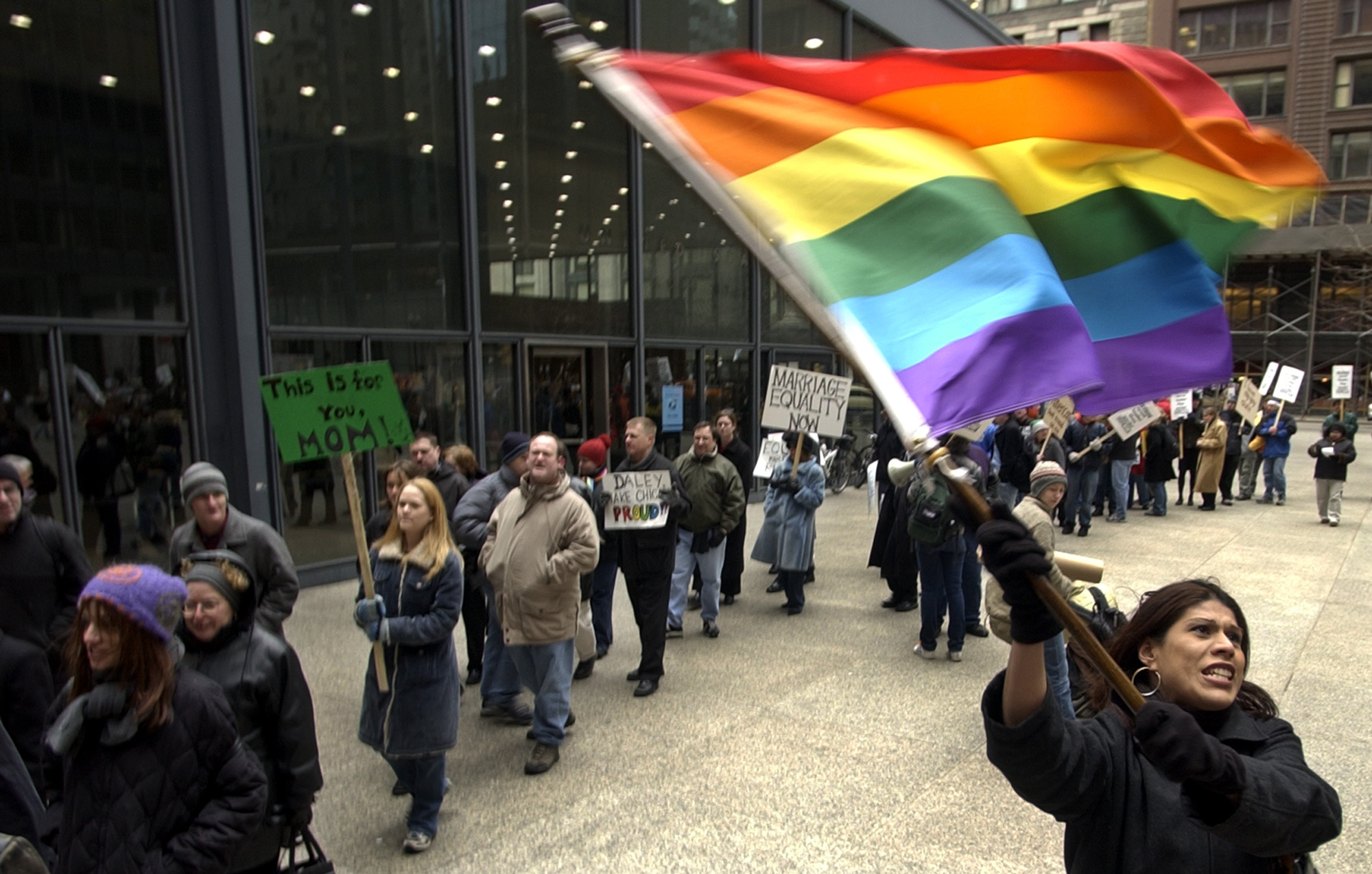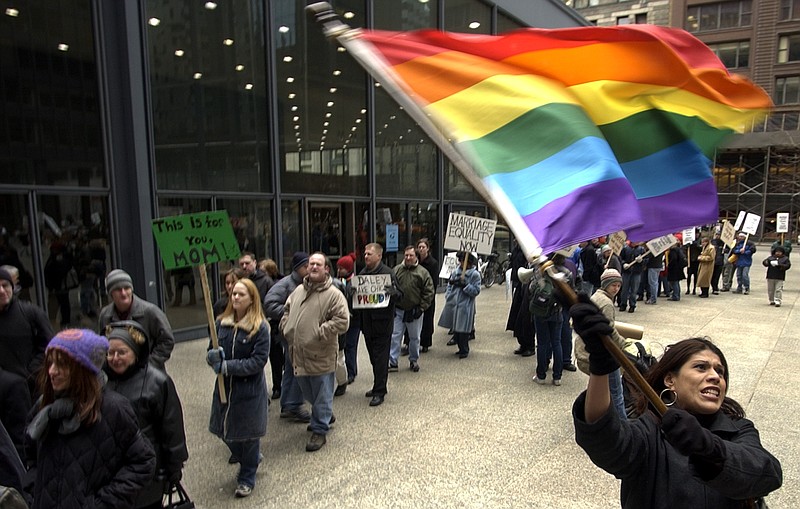 In this file photo taken March 11, 2002, Alexa Santos waves a gay pride flag in Chicago's federal plaza during a rally in support of equal marriage rights for gays. Area gay rights groups are calling on Cook County Clerk David Orr to defy a state law and begin issuing marriage licenses to same sex couples. Opponents of a gay marriage ban in Illinois don't have to worry about a fight from attorneys who would normally be responsible for defending the state's laws. Illinois Attorney General Lisa Madigan, and Cook County State's Attorney Anita Alvarez both have refused to defend the ban, saying it violates the state constitution That sets up a scenario where a judge quickly could strike down the 16-year-old law. The American Civil Liberties Union and Lambda Legal filed separate lawsuits against Cook County Clerk David Orr. He's responsible for issuing marriage licenses in the county. Alvarez represents Orr. And she says they both agreed with the plaintiffs. (AP Photo/M. Spencer Green, File)
In this file photo taken March 11, 2002, Alexa Santos waves a gay pride flag in Chicago's federal plaza during a rally in support of equal marriage rights for gays. Area gay rights groups are calling on Cook County Clerk David Orr to defy a state law and begin issuing marriage licenses to same sex couples. Opponents of a gay marriage ban in Illinois don't have to worry about a fight from attorneys who would normally be responsible for defending the state's laws. Illinois Attorney General Lisa Madigan, and Cook County State's Attorney Anita Alvarez both have refused to defend the ban, saying it violates the state constitution That sets up a scenario where a judge quickly could strike down the 16-year-old law. The American Civil Liberties Union and Lambda Legal filed separate lawsuits against Cook County Clerk David Orr. He's responsible for issuing marriage licenses in the county. Alvarez represents Orr. And she says they both agreed with the plaintiffs. (AP Photo/M. Spencer Green, File)TAMMY WEBBER
CHICAGO (AP) - Twenty-five Illinois couples were prepared for a long legal fight when they joined lawsuits challenging the state's ban on gay marriage. Turns out they won't get one - at least not from the attorneys who would normally be responsible for defending the state's laws.
Illinois Attorney General Lisa Madigan and Cook County State's Attorney Anita Alvarez have refused to defend the 16-year-old ban, which defines marriage as between a man and a woman, saying it violates the state constitution's equal protection clause.
The decision has raised eyebrows among some legal experts who believe prosecutors are legally bound to defend Illinois law, and sets up a scenario where a judge could quickly strike down the marriage statute. Supporters of the ban say it's unconscionable that there might be nobody in court to defend it, and some are strategizing over how to intervene.
"I took an oath when I was sworn in to defend the constitution of the state of Illinois and I believe that's what I'm doing," Alvarez said in an interview with The Associated Press. "I'm not going to defend something I believe is in violation of the constitution."
Madigan, who did not respond to a request for comment, plans to file arguments next week in support of the lawsuits, which could be consolidated into one case.
The decision not to defend a state law is unusual, experts said, but not entirely without precedent. Prosecutors in other states have refused to defend other controversial laws, including in Nebraska, where the attorney general refused to defend that state's abortion screening law after a judge temporarily blocked it, because he felt it ultimately would be found unconstitutional.
The move, sure to thrust Illinois into the national spotlight as federal and other state courts wrestle with the gay marriage issue, was greeted with enthusiasm by couples involved in the lawsuits.
The Obama administration last year announced it would not defend the federal Defense of Marriage Act, though the U.S. House of Representatives' Bipartisan Legal Advisory Group took up the defense. A federal appeals court in California recently declined to reconsider its decision to strike down that state's ban on gay marriage, a case that could end up before the U.S. Supreme Court.
Currently, the District of Columbia and seven states - Connecticut, Iowa, Maryland, Massachusetts, New Hampshire, New York and Vermont - have legalized gay marriage. Voters in Washington state will decide whether to overturn a new law legalizing gay marriage, which was blocked from taking effect after opponents got enough signatures to put a referendum on the ballot.
"I was thrilled and excited," said Liz Matos, 41, who hopes to marry her partner of 15 years, Tanya Lazaro, with whom she has two young daughters. She said they considered entering into a civil union, legalized in Illinois last year, but decided it "didn't truly represent our relationship and what we mean to each other. We still felt that we deserved more."
The American Civil Liberties Union and New York-based Lambda Legal filed separate lawsuits last month against Cook County Clerk David Orr, a supporter of gay marriage whose office is responsible for issuing marriage licenses in the county, which includes the city of Chicago.
The lawsuits were filed on behalf of the 25 couples, some of them from outside Cook County, but all of whom had applied for marriage licenses there and been denied. The suit closely followed the formal endorsement of same-sex marriage by President Barack Obama. Democratic Illinois Gov. Pat Quinn also recently stepped up his public support, though legislative moves to approve gay marriage remain stalled in the General Assembly.
Alvarez said it's her job to represent Orr - and they both agreed with the plaintiffs.
Peter Breen, executive director of the Thomas More Society, a private bar association that represents the Catholic Church, said the group "will be seeking relief from the court," though he didn't say exactly what that would be. Some experts have suggested the society could seek the right to defend the ban, though that's considered a long shot.
"You can't just say you feel it's unconstitutional," said Breen. "This ... puts people of the state of Illinois in a difficult place because their elected representatives are not defending their interests. If there is no argument or disagreement, then you'd really have a hollow judgment."
David Erickson, a former prosecutor and state appellate judge who now teaches at IIT Chicago-Kent College of Law, said it also potentially puts a private bar association in the position of being demonized for stepping forward to defend a state law. Erickson believes the law is unconstitutional but said Breen is right.
"Show me where it says any elected official, especially a prosecutor, can say, 'I won't defend law passed by a legislative body that is my coequal,'" Erickson said. "Only one body can say it's unconstitutional and that's the (Illinois) Supreme Court."
But fellow Kent College professor Douglas Godfrey said Alvarez and Madigan have a professional responsibility to ensure claims have merit, whether they're filing a lawsuit or defending one, and "in essence ... said we don't think Illinois' law will stand muster."
John Knight, director of the Lesbian, Gay, Bisexual, Transgender Project of the ACLU of Illinois, said plaintiffs will ask the judge to rule on Illinois' law based on their arguments and those of Madigan and Alvarez.
Lambda Legal's marriage project director, Camilla Taylor, said she never has had a case in which the defendants agreed with her.
It "reflects the fact that we're at a tipping point now ... (because) our government finds these laws indefensible," she said. She went on to add, "It comes at a time when a form of discrimination against a class of people in our society is so shameful and reprehensible that it's incapable of defense."
